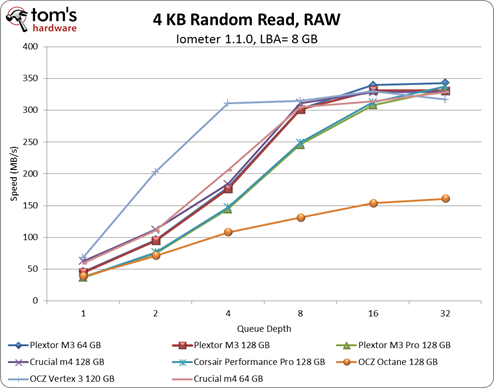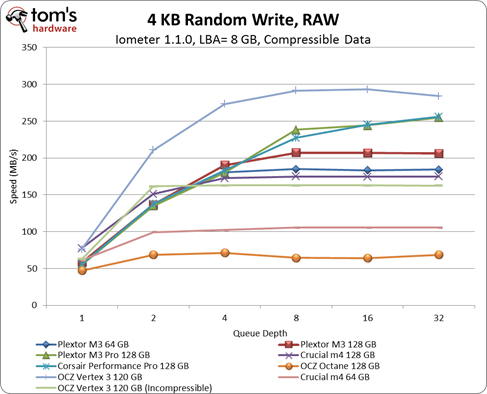Marvell-Based SSDs From Corsair, Crucial, OCZ, And Plextor: Tested
Benchmark Results: 4 KB Random Performance
Random Read Performance (background info)
Examples include antivirus scans and typing in Word
SandForce-based SSDs continue to lead the pack at lower queue depths, explaining why OCZ's 120 GB Vertex 3 excels in situations with fewer than eight I/O access. However, this does not mean that Marvell-based SSDs should be avoided; their performance is quite respectable especially at higher queue depths. With the exception of OCZ's Octane, every SSD is quite capable of punching through the 300 MB/s barrier at a queue depth higher than eight.
Corsair's 128 GB Performance Pro and Plextor's 128 GB M3 Pro both exhibit the same performance characteristics in 4 KB random reads, perhaps a result of their Toggle-mode NAND. In comparison, Crucial's mainstream-focused m4s actually lead the pack of Marvell-based SSDs. Plextor's M3 series is also a mainstream-oriented SSD product. Yet, surprisingly it outperforms the Performance Pro and the M3 Pro.
These performance differences only become apparent at higher queue depths. Scaling down, the 120 GB Vertex 3 and m4s share the spotlight, achieving ~60 MB/s with only one I/O access. Meanwhile, the other SSDs all offer performance varying between 40-50 MB/s.
Random Write Performance, Compressible
Examples include email, file compression, and Web browsing
Get Tom's Hardware's best news and in-depth reviews, straight to your inbox.
SandForce's compression technology provides chart-topping performance benefits for the 120 GB OCZ Vertex 3—until you throw incompressible data in the mix, causing performance to drop drastically. In that context, the 128 GB Performance Pro and M3 Pro both lead the pack at queue depths higher than eight.
At the lower end of the scale, the 128 GB M4 delivers ~70 MB/s in 4 KB random writes, matching the 120 GB Vertex 3. Meanwhile, the rest of the pack falls slightly behind with speeds between 50 and 60 MB/s with only a single outstanding I/O operation. Interestingly, OCZ's 128 GB Octane falls behind the 64 GB m4, an exception to the general rule that higher capacity corresponds to better performance.
Current page: Benchmark Results: 4 KB Random Performance
Prev Page Test Setup And Firmware Notes Next Page Benchmark Results: 128 KB Sequential Performance-
uruquiora hellfire24crucial FTW!hmm , my M4 has 10x more BSOD than my vertex 3... Each i boot my pc and work with it i prepare myself for a BSOD with my M4...Reply -
joytech22 uruquiorahmm , my M4 has 10x more BSOD than my vertex 3... Each i boot my pc and work with it i prepare myself for a BSOD with my M4...Reply
That is what we in the I.T industry like to call: "Faulty Hardware".
If you considered that normal all this time, I have some bad news for you..
-
chesteracorgi With the price of SSDs coming down, Toms should start introducing 256 GB + drives into its reviews. It's nice to have the 64 & 128 GB reviews, but for power builders the 256 GB is becoming mainstream.Reply -
Cyclops21 Any tests planned on the Sandisk Extreme models. They were a Tom's recommend buy but I still haven't seen any benchmarks on Tom's.Reply -
cknobman I'd still say for most boot and program drives SandForce is the way to go as it has a significant performance edge.Reply -
Onus I've only installed 6-7 SSDs, with mixed results. Two with Sadforce controllers died within months or weeks (the RMA of one is yet to be tested). Given that the slowest SSD beats the pants off the fastest magnetic HDD, I have quickly reached the conclusion that reliability has to be the #1 criterion for SSDs, and I'm not sure Sandforce is there yet.Reply
-
ramon zarat uruquiorahmm , my M4 has 10x more BSOD than my vertex 3... Each i boot my pc and work with it i prepare myself for a BSOD with my M4...Reply
You must be joking... The list of forum thread complaining about SF controller instability is endless. The M4 actually has a very solid reputation. I've been running 2 128GB M4 in 2 different PC for the last 8 months. Not a single BSOD. They still both benchmark the same speed as day 1. Actually, the M4 was and might very well still be the best choice for balance between price, performance and reliability in the whole SSD market. In my book, there are only 3 manufacturers really worth mentioning when it comes to SSD: Crucial, Intel and Samsung.
Your unit is simply defective. That can happen to any manufacturer. RMA it and be happy.

